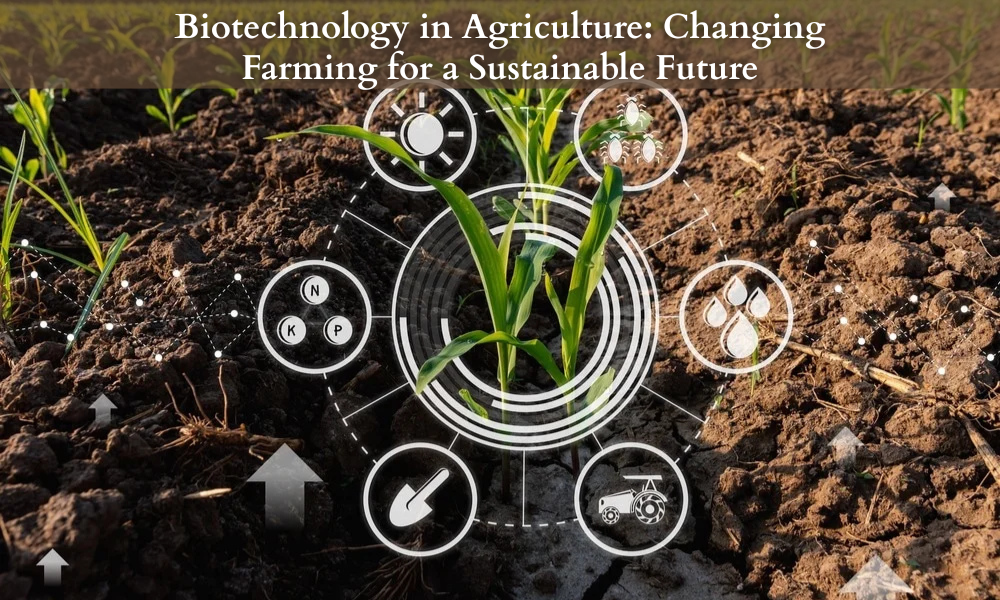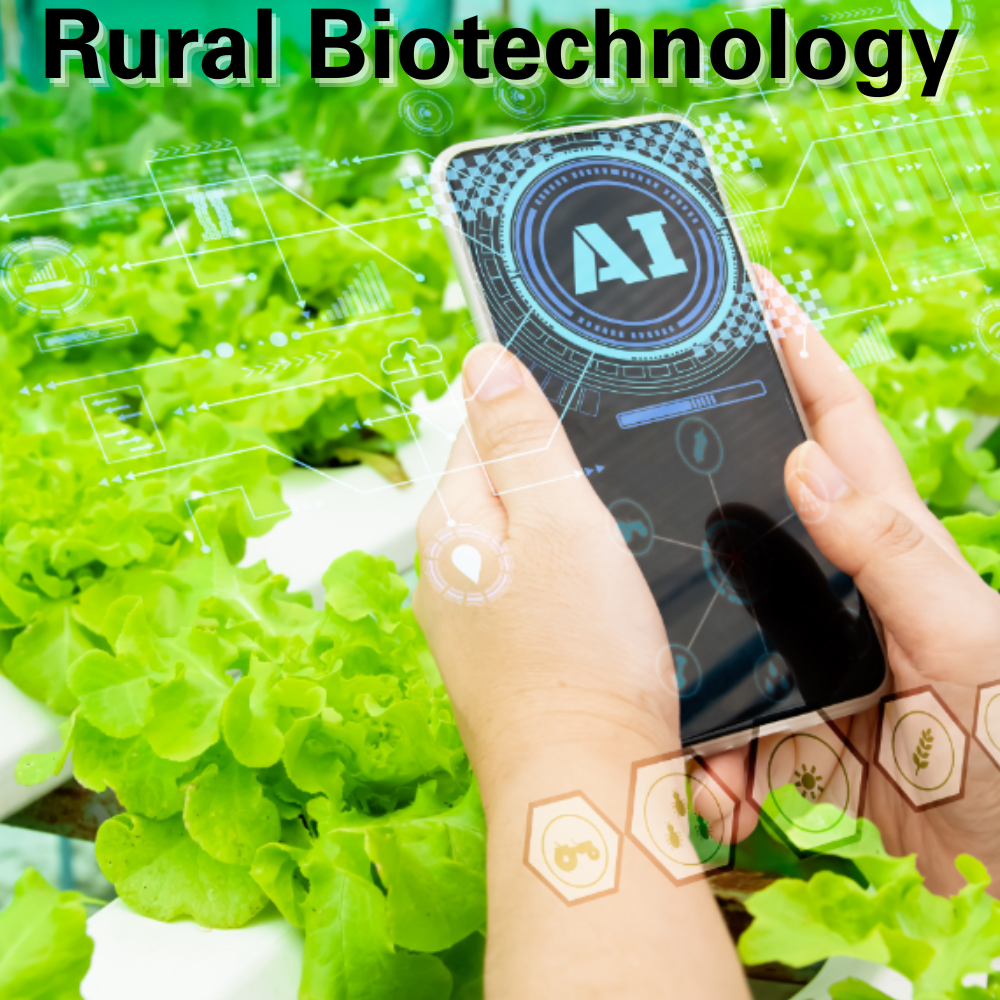Biotechnology in Agriculture: Changing Farming for a Sustainable Future
Introduction
Agriculture has continuously been the spine of human civilization, giving nourishment, crude materials, and employments to billions of individuals. Over the centuries, farming procedures have advanced significantly, from manual development to mechanization, and presently to a time characterized by science and development. One of the most critical headways in this change is biotechnology in farming. By applying logical strategies at the hereditary and atomic level, biotechnology is making a difference agriculturists overcome age-old challenges of bothers, maladies, climate alter, and asset confinements. More imperatively, it is forming a way toward maintainable Farming, where higher yields and natural security go hand in hand.

-
What is Rural Biotechnology?
Agricultural biotechnology alludes to the utilize of logical apparatuses and methods, counting hereditary designing, atomic markers, and tissue culture, to alter living organisms—plants, creatures, or microorganisms for rural purposes. Not at all like conventional breeding strategies, which depend on particular crossing over numerous eras, biotechnology permits researchers to present particular characteristics straightforwardly and precisely.
Examples include:
Developing crops that stand up to bugs and diseases.
Enhancing resistance to dry spell, warm, or salinity.
Improving wholesome substance of food.
Reducing the require for destructive chemical inputs.
-
Why is Biotechnology Imperative for Horticulture Today?
Modern Agriculture faces numerous challenges:
Population Development: By 2050, the worldwide populace is anticipated to reach 9.7 billion, requiring a 70% increment in nourishment production.
Climate Alter: Rising temperatures, eccentric precipitation, and visit dry seasons debilitate trim yields.
Resource Shortage: Arrive and water are getting to be progressively limited.
Pest and Infection Weight: Conventional pesticides are losing viability due to resistance.
Biotechnology gives imaginative arrangements to these issues by empowering agriculturists to develop more with less, guaranteeing nourishment security whereas lessening natural harm.
-
Key Applications of Biotechnology in Agriculture
Hereditarily Altered (GM) Crops
GM crops are maybe the most recognized result of agrarian biotechnology. These crops have been designed to express wanted characteristics, such as:
Insect resistance (e.g., Bt cotton, which produces a characteristic insecticidal protein).
Herbicide resistance (permitting successful weed control without harming crops).
Disease resistance against infections, organisms, and bacteria.
For case, Bt cotton in India has essentially decreased pesticide utilize, brought down generation costs, and expanded rancher incomes.
Dry spell and Climate-Resilient Crops
Scientists are creating crops that can withstand extraordinary climate conditions such as drawn out dry spell, warm waves, and saline soils. These advancements are especially significant for locales like Africa and South Asia, where climate alter specifically undermines livelihoods.
Bio fortification
Biotechnology is utilized to upgrade the wholesome quality of crops. For instance:
Golden Rice, enhanced with Vitamin A, points to diminish insufficiencies in creating countries.
Iron- and zinc-fortified crops offer assistance combat covered up starvation and malnutrition.
Atomic Breeding
Through marker-assisted choice, breeders can distinguish qualities related with alluring characteristics and present them more effectively than conventional strategies. This quickens the improvement of high-yielding and stress-tolerant varieties.
Microbial Biotechnology
Beneficial organisms are designed or chosen to advance plant development, settle nitrogen, or ensure against pathogens. Bio fertilizers and bio pesticides diminish reliance on chemical inputs.
Tissue Culture and Cloning
Plant tissue culture permits the fast increase of disease-free and high-yielding assortments. This is broadly utilized in crops like bananas, potatoes, and sugarcane.

-
Natural Benefits of Biotechnology
Contrary to the conviction that biotechnology as it were serves commercial purposes, it plays a crucial part in advancing sustainability:
Reduced Pesticide Utilize: Pest-resistant crops lower chemical utilization, profiting biological systems and farmers’ health.
Conservation of Water: Drought-resistant crops require less irrigation.
Reduced Nursery Gas Emanations: Higher yields on existing farmland decrease the require for deforestation and arrive conversion.
Soil Wellbeing Security: Herbicide-tolerant crops empower no-till Farming, which anticipates soil disintegration and jam natural matter.
-
Financial and Social Impacts
Higher Yields and Salaries: Ranchers receiving biotech crops regularly report moved forward efficiency and profitability.
Lower Generation Costs: Decreased require for fertilizers, pesticides, and labor-intensive practices.
Food Security: Biotech crops offer assistance guarantee steady nourishment supplies, particularly in creating nations powerless to trim failures.
Empowerment of Little Ranchers: With get to biotech seeds, smallholders can compete more successfully and secure way better livelihoods.
-
Moral and Security Concerns
Despite its benefits, rural biotechnology faces feedback and scepticism:
Health Concerns: A few individuals stress around the long-term impacts of expending GM nourishments, in spite of the fact that logical thinks about have found them safe.
Environmental Dangers: Fears incorporate cross-pollination with wild species, misfortune of biodiversity, and the rise of “super weeds.”
Corporate Control: Licenses and seed imposing business models by huge enterprises raise questions approximately farmers’ freedom and seed sovereignty.
Cultural Acknowledgment: In a few locales, resistance to hereditarily altered crops is driven by social, devout, or social beliefs.
To address these issues, solid administrative systems, straightforward investigate, and open mindfulness are essential.
-
Biotechnology and Maintainable Development
Agricultural biotechnology straightforwardly contributes to the Joined Together Countries Economical Improvement Objectives (SDGs), including:
Zero Starvation (SDG 2): By moving forward yields and nourishment security.
Good Wellbeing and Well-being (SDG 3): Through bio fortified crops that combat malnutrition.
Responsible Utilization and Generation (SDG 12): By decreasing reliance on chemical inputs.
Climate Activity (SDG 13): By advancing climate-resilient crops and decreasing natural impacts.
-
The Future of Biotechnology in Agriculture
Looking ahead, biotechnology is anticipated to play an indeed more prominent part in Agriculture through developments such as:
CRISPR-Cas9 Quality Altering: A exact and cost-effective apparatus to alter trim genomes without presenting outside DNA, making it more worthy socially and ethically.
Synthetic Science: Planning modern organic frameworks to improve edit strength and productivity.
Smart Farming with Biotechnology and AI: Combining hereditary changes with accuracy Agriculture for data-driven, effective farming.
Microbiome Building: Controlling soil and plant organisms to upgrade supplement take-up and push resistance.
Climate-Specific Assortments: Creating crops custom fitted to particular locales and climate conditions.
Conclusion
Biotechnology in horticulture speaks to an effective device for changing Farming into a more beneficial, economical, and flexible framework. It offers arrangements to a few of the most squeezing challenges of our time food security, climate alter, and asset shortage. Be that as it may, its victory depends not fair on logical breakthroughs, but too on capable administration, reasonable get to, and open trust.
By adjusting development with supportability and moral contemplations, biotechnology can offer assistance ranchers nourish the world whereas ensuring the planet for future eras. The ranches of tomorrow will not as it were depending on soil and seeds but moreover on science and innovation, making biotechnology a foundation of maintainable farming.
